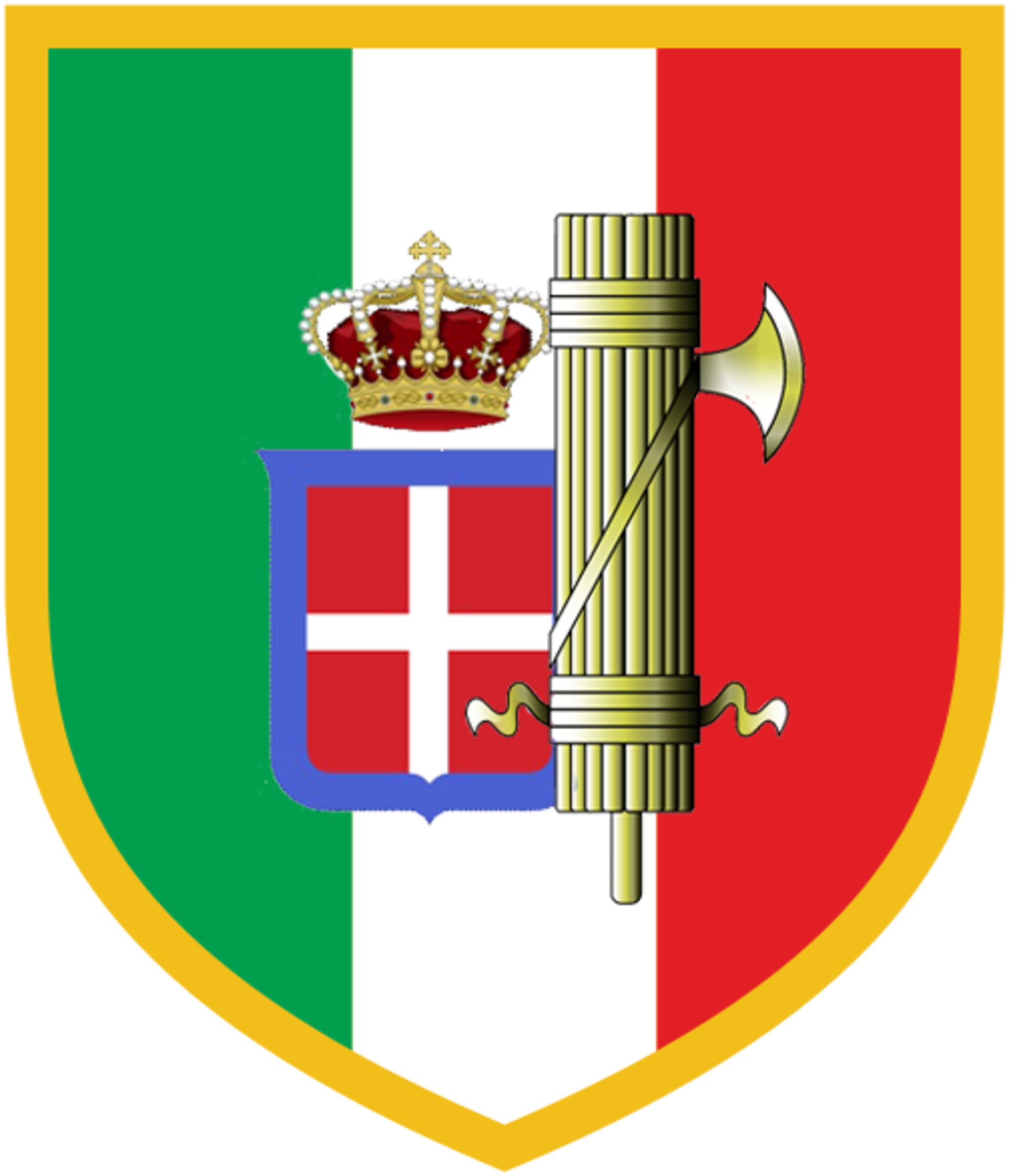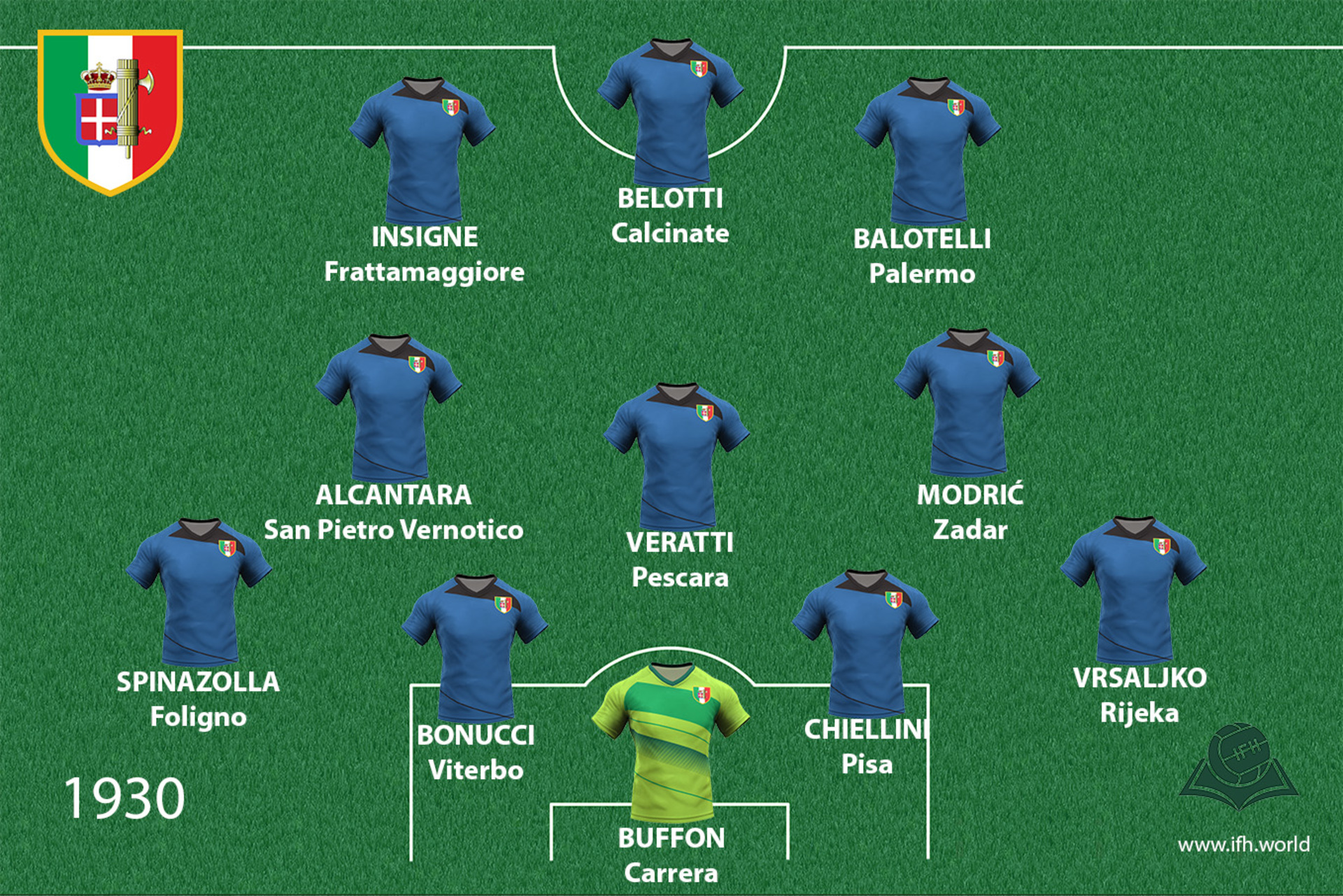Kingdom of Italy
Between 1922 and 1943, the Kingdom of Italy was ruled by the fascists, led by duce Benito Mussolini. Still, they would, through numerous compromises, destroy all possibilities to create a true totalitarian regime.

Coat of arms
Shirt
| Position | First name | Last name | Mjesto rođenja | Like | Dislike | |
|---|---|---|---|---|---|---|
| GK | Danijel | SUBAŠIĆ | Zadar |
70 |
5 |
|
| GK | Gianluigi | BUFFON | Carrera |
18 |
0 |
|
| GK | Gianluigi | DONNARUMMA | Castellammare di Stabia |
16 |
4 |
|
| DC | Angelo | OGBONNA | Cassino |
4 |
2 |
|
| DC | Giorgio | CHIELLINI | Pisa |
10 |
0 |
|
| DC | Leandro | BONUCCI | Viterbo |
12 |
3 |
|
| DC | Mattia | CALDARA | Bergamo |
2 |
2 |
|
| DRC | Andrea | BARZAGLI | Fiesole |
6 |
0 |
|
| DRC | Daniele | RUGANI | Lucca |
4 |
2 |
|
| DLC | Alessio | ROMAGNOLI | Anzio |
5 |
1 |
|
| DRL | Matteo | DARMIAN | Legnano |
3 |
2 |
|
| DRL | Šime | VRSALJKO | Rijeka |
54 |
7 |
|
| DR/MR | Davide | ZAPPACOSTA | Sora |
5 |
1 |
|
| DMC/DC | Daniele | DE ROSSI | Rome |
11 |
1 |
|
| MC | Claudio | MARCHISIO | Turin |
6 |
0 |
|
| MC | Lorenzo | PELLEGRINI | Rome |
6 |
1 |
|
| MC | Luka | MODRIĆ | Zadar |
90 |
8 |
|
| MC | Marco | VERATTI | Pescara |
7 |
0 |
|
| MC | Thiago | ALCANTARA | San Pietro Vernotico |
18 |
1 |
|
| MRC/DR | Alessandro | FLORENZI | Rome |
7 |
1 |
|
| ML/DL | Leonardo | SPINAZZOLA | Foligno |
1 |
1 |
|
| AMC | Nicolo | ZANIOLO | Massa |
2 |
0 |
|
| AMRLC | Giacomo | BONAVENTURA | San Severino Marche |
0 |
2 |
|
| AMRL | Antonio | CANDREVA | Rome |
1 |
3 |
|
| AMRL/SS | Federico | BERNARDESCHI | Carrara |
7 |
1 |
|
| AMRL/SS | Lorenzo | INSIGNE | Naples |
10 |
3 |
|
| FRLC | Domenico | BERARDI | Cariati |
19 |
2 |
|
| FRLC | Fabio | QUAGLIARELLA | Castellammare do Stabia |
11 |
0 |
|
| FRLC | Stephen | EL SHAARAWY | Savona |
5 |
1 |
|
| FC | Andrea | BELOTTI | Calcinate |
5 |
3 |
|
| FC | Ciro | IMMOBILE | Torre Annunziata |
9 |
3 |
|
| FC | Mario | BALOTELLI | Palermo |
5 |
5 |
A large part of Italian society considered themselves a nation that was “defeated” in the Paris peace treaties in which Italy gained a lot less than was promised. Catastrophic work conditions and economic disorder opened a great possibility of a communist upheaval in the country.
In the beginning of 1919 in Milan, the Fascist Party (Fascio Italiano di Combattimento) was founded by Benito Mussolini. Their brutal and effective crushing of worker strikes and their anti-communist nature ensured they were favored by industrialists, landowners, the monarchy and the Church that viewed fascism as a liberator from communism.
In October 1922, the fascists took over important facilities, institutions and army barracks all over Italy. They entered Rome peacefully, without any resistance by the authorities. Mussolini soon assumed the duties of prime minister and minister of the interior. In the name of national unity, they were against a democratic multiparty system and they began destroying organizations of non-fascist parties, which led to a reduction in the number of strikes. After dealing with political adversaries (Giacomo Matteoti), Mussolini also dealt with extreme fascists who formed the revolutionary core of the movement. Mussolini was afraid of his own militant followers, local rases and their squardistas, which would eventually be one of the reasons for his numerous compromises with other powers in Italy (bankers, the Church, monarchists, etc.)
After becoming prime minister, he took all necessary steps to gratify the Church. Religious education became compulsory in elementary schools, the country allocated funds for restoration of ruined churches, and all taxes that concerned the Church or the clergy were abolished. Most important of all, Italy regulated its relations with the pope with the Lateran Treaty (1929), recognizing the creation of the papal state of Vatican inside Rome. Naturally, this reconciliation ensured that the Church would support fascism, ensured a large number of Catholic votes in the coming elections and was of critical importance for the popularity of the movement in the 30s.
His reforms benefitted large landowners, industrialists and corporations. The economic model/system in fascist Italy was corporatism. The entire country was subordinate to corporate interests and corporate owners, while the people were strictly controlled by the police, the military and paramilitary groups, along with being under thorough surveillance. People who had capital and capitalists held the highest possible functions and literally governed the entire fate of the nation, while laws became completely subordinate to corporate interests.
Incitement of war and violence turned out to be critical for achieving cohesion, discipline and the explosive energy of fascists regimes, so Mussolini celebrated war as the source of human progress, saying that “war was for men what maternity was for women”. Despite this rhetoric and way of thinking, fascist Italy’s foreign policy portrayed it as one of the main proponents of world peace, which is why had many admirers among European conservatives such as British politicians such Winston Churchill and Austen and Neville Cahmberlain. Mussolini became the only European statesman that actively resisted the expansion of Nazi Germany by mobilizing troops on the Austrian border after Austrian Nazis killed the chancellor of Austria in 1934.This trust was partially shaken with the Italian attack on Ethiopia, the only independent African country, in 1935. The League of Nations did not impose heavy sanctions on Italy, since no one wanted to worsen economic and political relations with Italy, and several countries had numerous colonies in Africa and Asia.
Sources
- Darko DUKOVSKI, Istra i Rijeka u prvoj polovici 20. stoljeća (1918. - 1947.), Zagreb, 2010.,
- Grupa autora, Povijest: Prvi svjetski rat i poslijeratno doba (1914. - 1936.) , knjiga XVI., Zagreb 2008.
- Alaster HAMILTON, Fašizam i intelektualci : 1919-1945., Beograd, 1978.
- Jerzy HOLZER, Komunizam u Europi : povijest pokreta i sustava vlasti, Zagreb, 2002.
- Robert O. PAXTON, Anatomija fašizma, Tim press, Zagreb 2012.
- Ignazio SILONE, Fašizam : njegov postanak i razvitak, Zagreb, 2006., 62
- ''Fašizam'',http://www.enciklopedija.hr/Natuknica.aspx?ID=1904
- Antun ROŠA, ''Između dva nacionalizma budi se treća strana - Ukrajinski anti-fašisti pozivaju na otpor protiv novih ekstremista i ostataka starog režima'' ,http://www.advance.hr/vijesti/izmedu-dva-nacionalizma-budi-se-treca-strana-ukrajinski-anti-fasisti-pozivaju-na-otpor-protiv-novih-ekstremista-i-ostataka-starog-rezima/
- ''Ron Paul bez cenzure: "Amerika tone u fašizam, sistem u kojem vladaju korporacije i autoritativni režim", http://www.advance.hr/vijesti/ron-paul-bez-cenzure-amerika-tone-u-fasizam-sistem-u-kojem-vladaju-korporacije-i-autoritativni-rezim/
- Coat of arms: http://www.listal.com/list/1930s-italy-national-football-team
